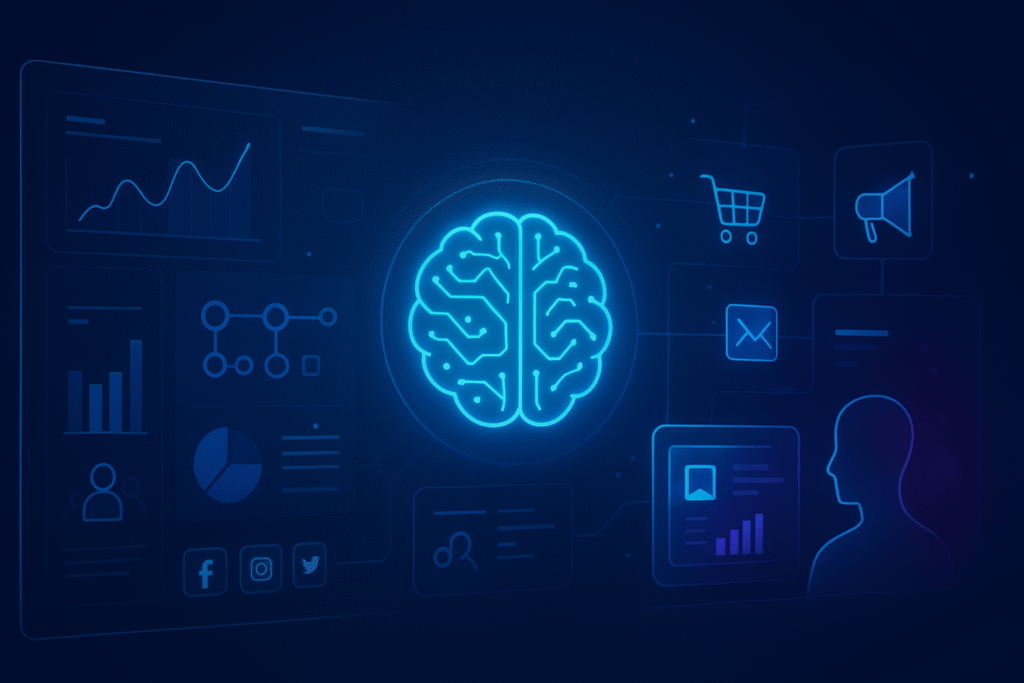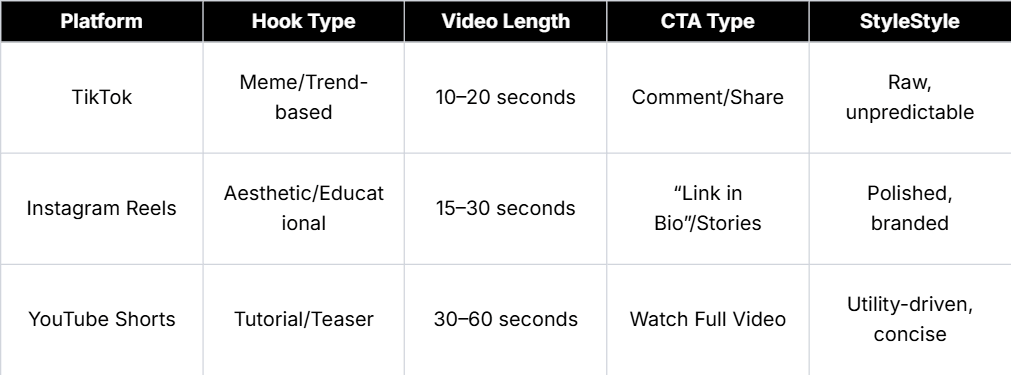Predictive Marketing in Action: How AI Personalization is Reshaping Customer Behavior in 2025


Platform-specific short-form video strategies: TikTok favors trend-driven content, Instagram Reels suits polished branded visuals, and YouTube Shorts is ideal for utility-driven teasers.
The Coffee That Knew You Better Than Your Barista
A few months ago, Olivia—a marketing director at a national coffee chain—noticed something fascinating. Their loyalty app had just rolled out a new AI-powered feature that used predictive analytics to personalize push notifications.
A regular customer, John, started getting offers for oat milk lattes at precisely 8:45 a.m.—right before his commute. On rainy days, the app sent him comfort drink suggestions like hot mochas. By the third week, John wasn’t just responding—he was buying more, visiting 27% more frequently.
No one on Olivia’s team had manually crafted those messages.
They were powered by predictive AI.
That’s when she realized: Marketing had shifted from campaigns to calculated conversations—fueled not by guesswork, but by data science and machine learning.
What Is Predictive Marketing? (Beyond the Basics)
Predictive marketing is not about reacting faster. It’s about knowing what your customer will do next—and being there first.
At its core, predictive analysis for customer behavior uses:
- Historical data
- Machine learning (ML) algorithms
- Real-time signals
…to forecast actions such as:
- Likelihood to purchase
- Potential churn
- Ideal product recommendations
- Lifetime value estimation
And with generative and decision-based AI now embedded in marketing platforms, these predictions aren’t just accurate—they’re actionable in real-time.
The Stats That Prove Predictive Works
Let’s get quantitative:
- 80% of consumers are more likely to buy from brands that offer personalized experiences.
– Epsilon Research, 2023 - Predictive analytics can increase marketing campaign ROI by up to 30%, according to McKinsey.
- Companies using AI-based personalization generate 40% more revenue from those activities than their competitors.
– BCG, 2024 - Netflix saves $1 billion annually through predictive personalization that reduces churn.
– Statista & Netflix Engineering Blog
This isn’t about future potential. Predictive AI is already driving measurable results for serious digital marketers.
How AI Powers Predictive Behavior Modeling
1. Data Ingestion and Segmentation
Modern AI tools ingest vast volumes of structured and unstructured data:
- CRM entries
- Browsing behavior
- Transaction history
- Social listening signals
- Even offline data (POS, call center logs)
AI then clusters users into micro-segments, often down to a “segment of one.”
Example: Instead of targeting “women 25-35,” predictive AI targets “female professionals who browse skincare after 9 p.m. and abandon cart on Wednesday nights.”
2. Predictive Scoring Models
AI assigns probabilities to customer actions using models like:
- Propensity to Buy
- Next Best Action (NBA)
- Churn Risk Scores
- CLV (Customer Lifetime Value)
These scores trigger real-time personalization: content changes, discount offers, onboarding flows, or remarketing ads.
Implementing predictive models like this effectively requires more than just data—it requires a customer-centric strategy. The foundational book, ‘Personalized: Customer Strategy in the Age of AI,’ provides the essential blueprint for aligning AI with business goals to create truly transformative customer experiences. Develop your winning strategy. Get the book here.
3. Automated Decision Engines
Advanced systems don’t just score—they act.
Platforms like Salesforce Einstein, Adobe Sensei, and Dynamic Yield integrate AI decisioning engines that auto-optimize journeys across:
- Web
- App
- Ads
- Chatbots
The result? Personalized experiences at scale—without a human needing to hit “send.”
From Personalization to Hyper-Relevance
Personalization used to mean inserting a first name in an email.
Now, AI lets marketers:
- Tailor homepage content based on predicted intent
- Recommend products dynamically based on AI-inferred taste
- Personalize SMS send-times based on past engagement
- Dynamically adjust loyalty offers to prevent churn
And it works.
Case Study: Sephora used AI-driven predictive personalization in their app to recommend products based on weather, skin type, and purchase history. Conversion rates rose by 48% for users exposed to predictive journeys.
Tools Serious Marketers Are Using for Predictive AI
Here’s a stack that’s shaping the future of customer behavior modeling:
| Platform | Use Case |
|---|---|
| Salesforce Einstein | Predictive scoring, AI email personalization |
| Bloomreach | Product and content recommendations |
| Emarsys (SAP) | Predictive churn, CLV, cross-channel orchestration |
| Segment + Amplitude | Behavioral data pipelines for AI analysis |
| Pega Customer Decision Hub | Real-time “next-best-action” automation |
These platforms let you unify data, build ML models, and deploy personalization across all touchpoints.
Predictive vs Traditional Campaigns: What’s the Difference?
| Feature | Traditional Campaigns | Predictive AI Campaigns |
|---|---|---|
| Segmentation | Demographic-based | Behavior and intent-based |
| Timing | Pre-set schedule | Dynamic, based on predicted action |
| Personalization | Static | Adaptive in real-time |
| Optimization | Manual A/B testing | Self-learning through AI |
| ROI | Moderate | High (20–40% uplift on avg) |
How We Help Digital Marketers Master Predictive Personalization
At the serious, enterprise level, predictive marketing demands:
- Clean, unified data
- Seamless tech integrations
- Clear KPIs for predictive ROI
We partner with brands to:
- Audit data readiness and integrate pipelines for AI modeling
- Select and implement predictive marketing platforms tailored to industry needs
- Build test-and-learn predictive journeys across email, app, and web
- Train internal teams on AI interpretation and strategy
- Deploy experimentation frameworks for continuous AI learning
We’re not just advisors—we’re translators between marketing intuition and machine intelligence.
The New Marketing Mindset: Predict, Don’t React
Predictive AI isn’t about automating marketers out of the job. It’s about elevating your role to strategist—where your focus is on customer lifetime value, journey architecture, and brand equity… not just open rates and impressions.
Your customer leaves a trail of intent in every click, pause, and purchase.
With predictive analytics and AI personalization, you can follow that trail—not just to understand what they’ve done, but to influence what they do next.
So the real question is:
Are you still responding to customer behavior—or are you ready to anticipate it?
You’ve seen the future of marketing: hyper-personalized, predictive, and powered by AI. The journey from insight to implementation requires a master plan. ‘Personalized: Customer Strategy in the Age of AI’ is that plan. This isn’t just a book; it’s your strategic guide to building the customer-centric business of tomorrow. Start your transformation. Get your copy now.
Related Posts
Mastering Zero-Click Marketing: How Structured Data & FAQ Content Fuel Featured Snippets
Adapting to Cookie Deprecation: How Digital Marketers Can Win with Privacy-First Marketing
Google EEAT Explained: How to Boost Rankings with Expertise & Trust (2025 Guide)
Google SGE Update: 7 No-BS Ways to Optimize for AI Search (Before It’s Too Late)

